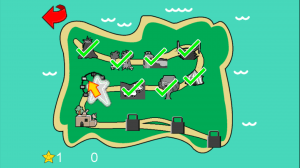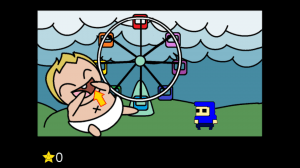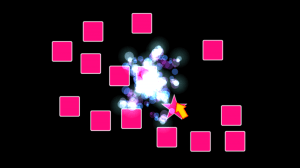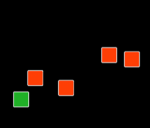 For the last 2 years I have been working with the WESC Foundation in Exeter to develop a computer game to improve vision in children and young people with partial visual loss. In EyeLander you play the role of a character (The “EyeLander”) who must escape from an island using her visual skills. You have to make your way through a series of challenges to escape the erupting volcano, including dodging lava, an angry cow and a giant laughing baby! The only way to get through them to your boat is to find various coloured target shapes hidden amongst distracting items on the screen.
For the last 2 years I have been working with the WESC Foundation in Exeter to develop a computer game to improve vision in children and young people with partial visual loss. In EyeLander you play the role of a character (The “EyeLander”) who must escape from an island using her visual skills. You have to make your way through a series of challenges to escape the erupting volcano, including dodging lava, an angry cow and a giant laughing baby! The only way to get through them to your boat is to find various coloured target shapes hidden amongst distracting items on the screen.
Although based closely on visual search training that has been shown to be effective in adults with hemianopia (see earlier post), EyeLander is unique in that is has been developed in collaboration with children at WESC and social computing researchers from Lincoln’s Computer Science department, adopting a user centred design approach. We believe this will make visual search training more effective and fun for children and even adults with visual field loss. 
We will be evaluating the effectiveness of the game over the next few months and are interested in hearing from you if you suffer from any form of partial visual loss and would be willing to take part in the evaluation. We are also seeking involvement from children in the South West with normal vision to take part in the research by playing the game and being an EyeLander!
Please contact myself (tlhodgson@lincoln.ac.uk) or Jonathan Waddington (JWaddington@wescfoundation.ac.uk tel:01392 454200) if you would like to know more or take part in the research.




